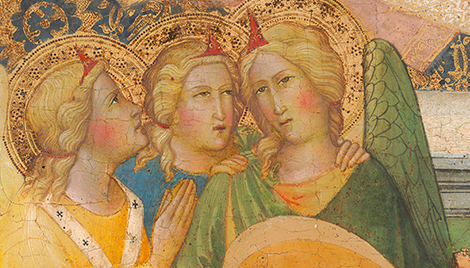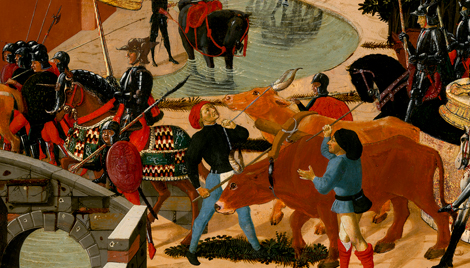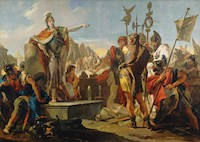History of Art Institutional Fellowships
Advanced training in European art history requires direct exposure to the object of study, prolonged access to key information resources such as libraries and photographic archives, the development of professional relationships with colleagues abroad, and sustained immersion in European cultures. These related needs are often best satisfied by extended engagement with a European art research center. The Kress History of Art Institutional Fellowships are intended to provide promising emerging art historians with the opportunity to experience just this kind of immersion.
History of Art Institutional Fellowship Guidelines
Description
Beginning 2026, six pre-doctoral Kress Institutional Fellowships in the History of European Art will be awarded every other year. The Kress Foundation is not receiving applications for these fellowships in 2025. Each fellowship provides a two-year research appointment hosted by one of the following European art history research centers:
- Florence Kunsthistorisches Institut / Institute for Art History
- Leiden Leiden University Centre for the Arts in Society (LUCAS)
- London Courtauld Institute of Art & Warburg Institute (jointly administered)
- Munich Zentralinstitut für Kunstgeschichte / Central Institute for Art History
- Paris Institut national d'histoire de l'art (INHA) / National Institute for the History of Art
- Rome Bibliotheca Hertziana
Eligibility
Restricted to pre-doctoral candidates in the history of art and related disciplines (such as archaeology, architecture, or classics). Nominees must be U.S. citizens or individuals matriculated at an American university. Dissertation research must focus on European art from antiquity to the early 19th century and applicants must be ABD by the time their fellowship begins. Candidates must be nominated by their academic department. Each nomination should be formally confirmed in a letter of recommendation from the department chair.
Please note: Each university is limited to two (2) nominees per academic department. The nominees must be applying for different research centers.
Nominations are confirmed as part of the Department Chair’s recommendation letter. All recommendation letters, including the Department Chair’s nomination, are securely submitted via a link that is emailed to recommenders once they are listed by the student on the fellowship application form in the grantee portal.
Deadline
The Kress Foundation is not receiving applications for these fellowships in 2025. Applications will next be considered in November 2026, for fellowships beginning the 2027-2028 academic year. Any inquiries relating to these updates may be sent to info@kressfoundation.org.
In addition to these six Institutional Fellowships, the Kress Foundation supports art history fellowships at other institutions. For a complete list, see Fellowship Partners.
How to Apply
Nomination & Registration
Ph.D. candidates who have been nominated by their departments should register for portal access at https://kressfoundation.fluxx.io.
The Kress Foundation is not receiving applications for the pre-doctoral Kress Institutional Fellowships in the History of European Art in 2025. Applications will next be considered in November 2026, for fellowships beginning the 2027-2028 academic year.
Application Requirements
The online application will require Fellowship candidates to provide the following information:
- Language proficiency list
- Confirmation that applicant is ABD or a list of outstanding requirements and the date at which they will be complete
- Name and email addresses of the Department Chair, Dissertation Advisor, and an additional Scholar who will provide letters of recommendation. Three (3) recommenders will should be identified in total, so if the Department Chair is also your Dissertation Advisor, select an additional scholar. If the Department Chair is not familiar with your work, they may simply write a brief letter confirming your nomination and you may choose another scholar to submit a fourth letter of recommendation.
- Summary of the proposed dissertation research project (15,000 characters)
- Description of the proposed research plan, emphasizing the need to be at the institution you have selected. You may also include, if appropriate, a description of proposed extended travel within Europe (9,000 characters).
- Description of the work completed on the dissertation (3,000 characters)
- Description of any previous research and travel experience abroad, with particular emphasis on familiarity with libraries and research facilities abroad (6,000 characters)
- A list of all other grants for which you are applying including the name of the award, the amount for which you are applying, and the time period and aspect of your project that this award would cover
Applicants will also be required to upload the following documents:
- Annotated bibliography containing works of primary concern to the proposed topic (maximum length five (5) pages)
- Budget indicating the major anticipated expenses for the fellowship period
- Curriculum vitae
- Official transcript from your current university
For step-by-step instructions on completing the online application please see the Portal Guide for the History of Art Institutional Fellowship Application.
Applicants and current fellows with questions for the host institutions can use the following European Research Center Contact Information.
Deadline & Notification
The Kress Foundation is not receiving applications for these fellowships in 2025. Applications will next be considered in November 2026, for fellowships beginning the 2027-2028 academic year.
Special Note About Visas
Individuals receiving a History of Art Institutional Fellowship will need to secure a study visa from the country in which they will be in residence while on the Kress fellowship. The visa application process varies from country to country and may require several weeks to complete, particularly given summer schedules at many of the European art research centers affiliated with this program. The Kress Foundation therefore strongly advises Fellowship recipients to take appropriate steps towards obtaining the proper documentation immediately upon acceptance of the award, and to apply for the relevant visa as soon as possible, to ensure a successful start to the first year of research.
The appropriate consulate may require you to apply for the visa in person and may ask for the following:
- Proof of suitable accomodation in the host country
- Proof of enough financial means to support yourself
- Proof of health insurance
- Proof of funds necesary to travel back to your home country, or a valid return ticket
Please note also that language can matter when communicating with consulates, especially in non-Anglophone countries. We have been advised, for example, that such English words as “research,” “work,” and “fellowship” may erroneously suggest work performed for compensation, which would require a different category of visa. Fellowship recipients may wish therefore to employ the word “study” as the most appropriate descriptive term for the activity they will be pursuing while at their European host institution. For the same reason, the financial support afforded by the fellowship might be best described as a “scholarship” rather than a “stipend.”
Finally, if your college or university has a study abroad office on campus, we encourage you to consult with them about the visa process and all facets of travel abroad.





